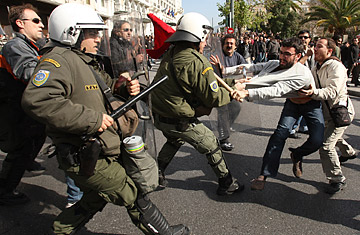
Police clash with protesters in Athens
Last week, the Greek government announced a series of painful austerity measures aimed at tackling a budget crisis so serious, it once seemed like the entire country could go bankrupt. Likening the need to drastically increase tax revenues and cut spending to a "wartime situation," the Socialist Prime Minister, George Papandreou, promised to take whatever steps were necessary to ensure the economic viability of the state. On Thursday, the country got a taste of how painful the process will be.
Greece ground to a halt as workers went on a 24-hour nationwide strike and tens of thousands of people took to the streets to protest civil-service pay cuts and higher taxes in the biggest and angriest demonstrations so far against the austerity measures. Although most of the protesters were peaceful — and even included in their ranks uniformed police officers and firefighters — groups of masked and hooded youths waged running street battles with riot police, smashing the windows of banks and luxury stores and hurling rocks and Molotov cocktails. The police responded by covering central Athens with a haze of tear gas. "War against the capitalists!" the protesters shouted, many with their faces covered to protect against tear gas. "No more sacrifices!"
"There's anger because people feel it was unfair that people with low wages who pay their taxes are having to pay again," says Miltos, a 39-year-old who works for an environmental organization and declined to give his last name.
Papandreou had tried to avoid provoking Greece's powerful unions and initially resisted making cuts to civil servants' base pay. But after the initial round of austerity measures, announced in December, failed to convince international markets and the country's European partners that Greece could rein in its ballooning deficit on its own, Papandreou's administration was forced to tack on a second, harsher round of measures. The $6.5 billion package includes cuts in civil servants' salaries, a freeze on pensions and a host of tax increases, including a 2% bump in the value-added tax (VAT).
Greece's unions, which had waged only halfhearted protests against the first round of austerity measures, immediately declared war. Over the past week, scattered protests involving tax officials, pensioners, garbage collectors and others have disrupted life in the city. Thursday's strike was the second called by Greece's main unions — representing about half the country's 5 million workers — in less than a week. Flights were halted when air-traffic controllers walked off the job, schools and government offices were shuttered, and public transport was disrupted.
So far, the intensity of the violence doesn't yet rival the worst of the riots that racked Greece in December 2008, when the fatal police shooting of a 15-year-old boy sparked weeks of street protests and vandalism. But since the government announced the second round of austerity measures, the pace and scale of the protests have escalated. Polls also indicate that popular support for the government's handling of the crisis is slipping — a recent survey by the Sunday edition of To Vima, an Athens newspaper, for instance, showed that most Greeks think it will take a long time for the country to pull itself out of its economic mess. More than 37% thought the recession would last three to four years, while 22% said it might last as long as a decade.
And the public mood promises to sour even further. Most of the austerity measures haven't even been implemented yet. The VAT increase goes into effect on March 15, and civil servants will see their upcoming Easter bonuses — equal to half a month's salary — slashed by 30%. Greeks are already feeling the pinch of the economic downturn, and many fear the measures will only deepen their pain. The government's official prediction is that the economy will shrink by 0.3% this year and then begin to recover. But many Greeks and economists think those expectations are overly optimistic.
While European Union officials have praised Greece's most recent round of austerity measures, many Greeks have been critical — and not just the protesters. Konstantinos Michalos, president of the Athens Chamber of Commerce, which represents more than 100,000 businesses, says the across-the-board salary cuts for civil servants would disproportionately hurt the poorest and lead to a decline in consumer spending. "The austerity package was necessary, but it's in the wrong direction," he says. "When the actual measures take effect, I think we will have even more demonstrations."
For now, Greek protesters are angry but resigned. Few believed the demonstrations would force the government to retract the measures, but they hoped to make their pain clear — and issue a warning to the government against cutting any deeper. With clouds of tear gas wafting over the capital on Thursday, it was clear that in Greece's struggle to bring its finances under control, no one will escape the sting.
